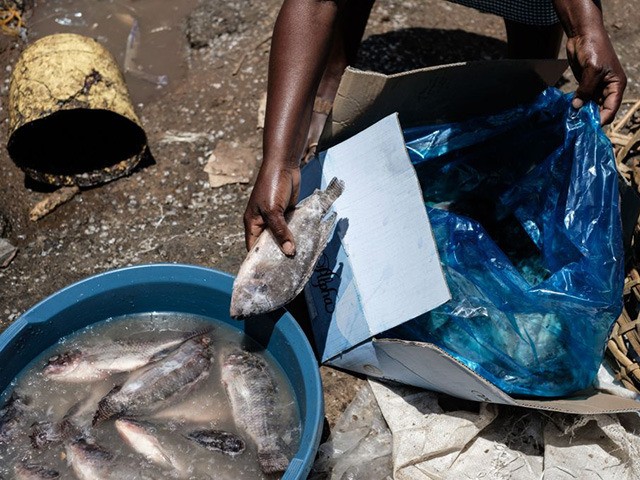The Chinese government is selling Kenya tons of fish poisoned with high levels of toxins like mercury, lead, and arsenic, the African country’s the Nation newspaper revealed in a study published Wednesday.
In the past three years, China has overwhelmed the Kenyan fish market with high volumes of cheap farmed fish like tilapia, making it impossible for Kenyans to subsist off of fishing in Lake Victoria as they cannot compete with the low prices of the Chinese product. Yet for years, reports have warned that the fish imported from Nairobi’s communist business partner is toxic, particularly dangerous to pregnant or nursing women who may pass on the poison to infant children.
Concern over both China’s devastation of Kenya’s traditional fishing economy and the dangers of eating Chinese fish led Kenyan authorities to impose a short-lived ban on Chinese fish in early 2019. The Communist Party responded by branding Kenyan officials’ reasonable concerns a “trade war” and threatening to cut funding for Kenyan Belt and Road Initiative (BRI) projects. The ban barely lasted through February of that year.
The BRI is China’s global infrastructure plan, pumping billions in predatory loans into developing nations, many who end up having to hand over their property to China. Kenya has been particularly victimized by BRI through the construction of the Standard Gauge Railway (SGR). While China promised lucrative jobs for Kenyans, it instead has largely used Kenyans for unskilled labor, flooding the country with illegal Chinese workers who take the jobs that may. These workers have been involved in a string of racist incidents and have reportedly set up an “apartheid” system to keep from interacting with African workers at construction sites.
The Nation‘s study simply required the newspaper to buy a box of imported fish — the journalists chose the size most commonly purchased by small restaurants, and asked scientists at the University of Nairobi to study the fish:
We took the box to the lab at the University of Nairobi for testing. The results revealed that cheap is, indeed, expensive. The fish samples had seven dangerous pesticides among them phosalone, which was detected at 0.07 parts per million (ppm). This is seven times more than the maximum allowable limit (MAL) of 0.01 ppm.
Other pesticides detected in the fish from China include tolyfluanid (0.022 ppm), flutonail (0.022ppm), deltamethrin (0.026ppm), acrinathrin (0.005ppm), pretilachlor (0.005) and tebufenpyrad at 0.001ppm.
These classes of pesticides can cause cancer, mouth ulceration, dysphagia and abdominal pain, among other diseases, if ingested. However, this is not all that Kenyans should worry about.
Scientists found the fish contained 427 times the amount of lead the China-controlled World Health Organization (WHO) deems safe for human consumption. The fish also tested high in other toxins like zinc, arsenic, copper, and other toxins, leading the University of Nairobi scientists to concluded that it was not safe for humans to eat.
The newspaper concluded that either the Kenyan government is failing to properly test the fish before allowing it on the market to ensure product safety, or China is deceiving Kenyan food inspectors by offering them quality fish, then shipping in large amounts of toxic fish.
“Either way, someone is sleeping on the job,” the newspaper concludes.
Kenya began importing fish from China in large quantities in the second half of the 2010s in response to low fish stocks in Lake Victoria. Local fishing industry declined slightly, opening the door to cheap Chinese imports, which then rapidly collapsed the local business entirely. A CNN report in 2018 blamed the decline in local fishing on “overfishing, a lack of infrastructure, and cheap Chinese imports.” Due to higher-technology fish farming, Chinese merchants can offer a much higher volume of product than locals simply using nets to collect whatever they can find in Lake Victoria. The Kenyan government has not invested in preserving fish stocks in the lake, Africa’s largest, or in bringing in advanced fishing technology to rely less on Chinese imports. Instead, it has turned to China with increasing urgency to feed its population.
The move to importing Chinese fish has only led to an even steeper decline in local fishing, in part because the government does not protect the environment where local tilapia grow.
“While tilapia and Nile perch are currently the favoured catches due to their high demand, uncontrolled flow of toxic substances from industrial and agricultural sources into its waters spells doom for the lake,” the Nation reported on Wednesday.
Kenya imposed a ban on tilapia from any country in late 2018 as an attempt to protect local industry. Chinese Ambassador to Nairobi Li Xuhang interpreted the measure as a direct hit on China, the top importer of tilapia to Kenya, and called the measure a “trade war.” China immediately responded by threatening to cut BRI funding. In January 2019, the Kenyan Department of Fisheries announced that it had lifted the ban.
“We were forced to lift the ban to ease the shortage after a huge consignment of fish got stuck at the port, impacting negatively on local supplies,” an official at the Fisheries Department told the Nation at the time. Officials insisted that there simply did not exist enough Kenyan fish to meet demand in the long term, particularly at affordable prices.
Two months later, another University of Nairobi study by the Nation found that the Chinese fish “contain traces of heavy metals that threaten human health.”

COMMENTS
Please let us know if you're having issues with commenting.